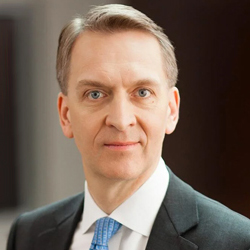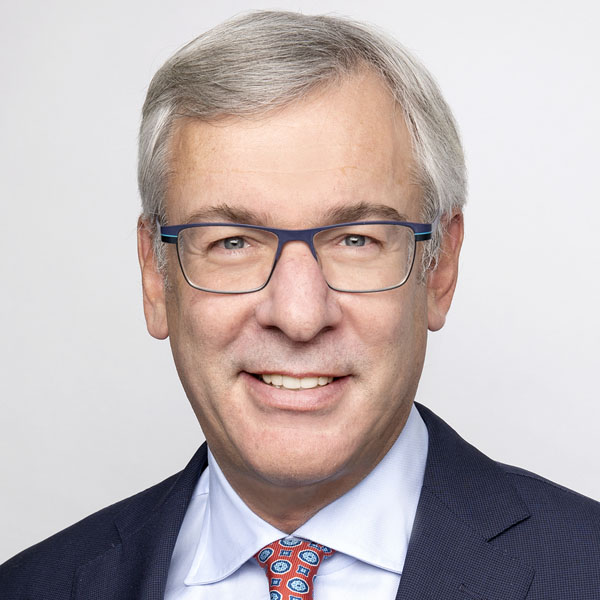Key Points:
- Brookfield is deploying its expertise to support businesses in their decarbonization goals, transforming carbon-intensive industries and developing clean energy projects.
- Brookfield’s recently spun-off business, a pure-play asset manager, aims to pay 90% of free cashflow in dividends.
- Its insurance business benefits from the synergies across Brookfield, with the ability to earn high returns.
- Brookfield is positively impacted by inflation, while the current premium placed on quality real estate plays to the strengths of its portfolio.
- According to long-time CEO Bruce Flatt, the scale achieved by Brookfield enables it to generate greater returns and attracts partnerships with global giants.
Leading Businesses toward a carbon-free world
Decarbonization. Digitalization. Deglobalization. This is the trio of megatrends identified by Brookfield CEO Bruce Flatt as the themes currently impacting every business.
Flatt believes his own business is well placed to benefit, with total capital raised of $15 billion for the Brookfield Global Transition Fund, the largest of its kind in the world.
Flatt is confident of exceeding that figure through the next fund to be launched soon, he told RBC CEO Dave McKay, in a keynote session at RBC Capital Markets’ Global Financial Institutions Conference in New York.
With approximately 25,000 megawatts (MW) of generating capacity, Brookfield, through its renewable power and transition business, is one of the world's largest investors in renewable power and climate transition assets.
Where CEOs were resisting decarbonization five years ago, they have now embraced the goal, Flatt said: “People like us need to be able to help them to do it.” Brookfield is now building renewables to support companies such as Amazon to reach their carbon-free objectives.
“Not that many people have the experience to build renewables, and the ability to operate and build industrial businesses. We had a unique opportunity to take that to our clients.”- Bruce Flatt, CEO, Brookfield
Flatt revealed that Brookfield is also in the midst of buying an electricity-generating utility, powered mostly by coal and natural gas, with the aim of transforming it into a renewables-powered business. This would accomplish the “double whammy” of achieving reasonable returns while increasing the value of the business by turning it green.
Brookfield’s track record is the foundation for these ventures, he added: “Not that many people have the experience to build renewables, and the ability to operate and build industrial businesses. We had a unique opportunity to take that to our clients.”
The company is also supporting businesses in the relocation of manufacturing from Asia to the U.S. and Europe, said Flatt. “They know they need a partner to build the plants for them, and they know it should be powered by renewables – we can provide that.”
Spin-off will offer big dividends
These developments have accelerated Brookfield’s rise to the status of the world’s leading alternative asset manager, with around $800 billion of assets under management (AUM).
Flatt described the recent spin-off of a 25% stake in Brookfield’s asset management business to shareholders. This created a pure-play asset manager, Brookfield Asset Management. Brookfield Corporation, the parent company which focuses on compounding capital over the long term, holds a 75% stake in the new listed entity.
Explaining the decision, Flatt said it reflected a natural split in investor interests. A public listing also provided “extra focus” to an already decentralized management team, he added. With an attractive income stream, the spun-off business will ultimately pay out 90% of free cashflow in dividends. Given its scale, this business is expected to be highly successful on its own.
What has not changed is Brookfield’s mission to create long-term value through its global reach, large-scale capital and operational expertise. The company’s scale enables it to partner with global giants, with Flatt citing recent large infrastructure transactions with Deutsche Telekom and Intel.
“We couldn’t have dreamed of partnering with those types of companies 20 years ago; we do it on a regular basis today,” he observed.
“We have a significant advantage in the insurance business because of our ability to put money to work and earn higher returns.”- Bruce Flatt, CEO, Brookfield
Quality proves critical to real estate fortunes
Unlike many, Brookfield takes a positive view of the current macroeconomic picture, Flatt told McKay.
While “modest” inflation was now affecting revenues, Flatt saw the odds of fair returns in equities and bonds as more positive than 18 months ago. He predicted that recent constraints on bank funding would lift, while pointing to the continuing power of institutional investors. Brookfield raised $100 billion of equity last year, a level Flatt expects to at least equal in 2023.
In part, Brookfield’s position is strong because inflation has a positive effect on many of its activities, particularly in sectors such as infrastructure and real estate.
In its real estate business, rents for high-quality properties across the world exceed pre-COVID levels by 50%, Flatt noted. Poor-quality real estate has suffered a corresponding slump, underlining Flatt’s maxim: “Quality wins.” He puts 80% of Brookfield’s real estate in the high-quality category.
Brookfield is now a big player in insurance too, following the spin-off of Brookfield Reinsurance, in 2021.
While joking that the business entered this sector “partly because we had nothing else to do during COVID”, Flatt sees obvious synergies between insurance and Brookfield’s excellent products in infrastructure and real estate. “We have a significant advantage in the insurance business because of our ability to put money to work and earn higher returns,” he added.
“The greatest benefit of financial success is the compounding of everything: returns, wealth, interest and knowledge.”- Bruce Flatt, CEO, Brookfield
The compounding effects of success
While it has established operations in more than 30 countries, Flatt believes Brookfield is insulated from geopolitical volatility by the nature of those activities and by investing into the backbone of the global economy. “They are local investments – deliver water to a house through a toll road that we have, power to an office building that we own,” he explained. “These all earn revenues in-country, so our businesses generally aren’t dependent on trade across borders.”
Having joined Brookfield in 1990 and held the CEO post since 2002, Flatt is now savoring the opportunities that come with the company’s unprecedented scale. “The greatest benefit of financial success is the compounding of everything: returns, wealth, interest and knowledge,” he shared.
For the future, Brookfield is focused on expanding its reach still further by maintaining its dominant position in the investment landscape. “Our goal is to have access to more money than almost anybody else – that will allow us to do and support things in ways that we can achieve returns nobody else can achieve,” Flatt declared.

